
I found myself pondering this recently after a meeting where I serve as secretary in a Board of Directors position. I’m the designated notetaker, having to capture as much as possible that people say, and putting it in an accurate context. Textbook journalism, except I’m reporting to the board rather that writing it up for a newspaper, magazine or online.
The meeting had differences of opinion. No question that some people were upset about the issue under discussion. Their tone of voices and how they addressed others reflected this – on both sides. Voices were raised. Some people clearly chose not to listen to the other side. It was fascinating.
At one point, one of the board members compared the differences of opinion to the current climate in the United States – “we can’t seem to come together.” I happened to chair this meeting as well as being the notetaker, and I disagreed with that individual. My perspective was that we had the meeting to hear from all sides and we wanted everyone to air their perspectives.
Without hearing what people felt and believed, how could we make the best decision? There was no pre-ordained decision (as some implied during the open discussion), and there was validity to everything brought to the table. Having differences isn’t bad. In fact, I would argue it’s important to hear opposing views to strengthen any final decision.
What became even more apparent as I perused my notes later and began writing them up, is that the process of committing to paper allows you to step back and better analyze positions, ideas, thoughts, arguments, facts, direction, insights, perspectives. You understand where people are coming from.
At the same time, you remove yourself from the high-charged emotions. You take what is said and write it down. “There it is. That’s what was said. Makes sense.” Then you take what the next person says and do the same thing, and you can see validity to those points. And, so on.
As you dig deeper into the session, you broaden your view, and I would argue you are put in an advantageous position to make a better decision. Emotions – anger, resentment, sadness, joy – all are tremendously important and play huge parts in how humans look at things and choose what they believe and where they stand.
Putting it down on paper allows you to see (and go back and reread and step back a bit) with greater specificity (and dispassionately) the strengths of arguments, how much support there is for one position or another and whether there is a consensus or majority to move forward.
Taking notes helps you learn. You pick up nuances. You better understand explanations. You get a fuller sense of a discussion. We’d all be better served sitting down and writing notes when hearing a discussion or argument, then going back and writing